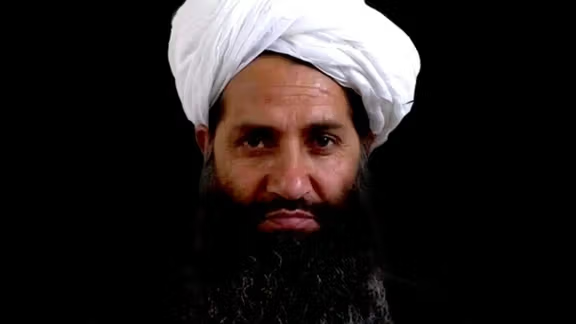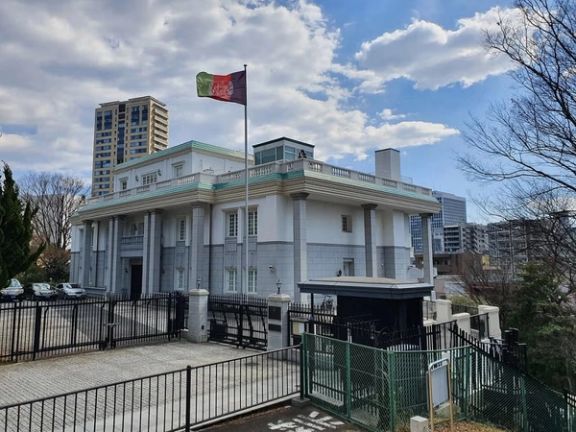As a result of negotiations on 25 May, Mullah Hibatullah Akhundzada emerged as one of the agreed-upon candidates for the Taliban’s leadership.
the founder of the Taliban, had claimed the right to lead the group following his death, and the killing of Mansour reignited this dispute. Similarly, the faction led by Mullah Mohammad Rasul, which had split from the Taliban and declared itself the Supreme Council of the Islamic Emirate of Afghanistan, also contested Akhundzada’s leadership.
Though the crisis lingered, just a few days later, on 29 May 2016, Akhundzada was officially appointed as the leader of the Taliban.
Akhundzada is ethnically Noorzai, from Kandahar. Religiously, he is a staunch follower of the radical Deobandi school of thought, to which many Taliban officials are directly or indirectly aligned.
During the war against the former Soviet Union, Akhundzada was politically aligned with Mohammad Younus Khalis and fought under the command of Mullah Mohammad Hassan Akhund, now the Taliban’s Prime Minister, in Kandahar against Soviet forces.
Why Was Akhundzada Chosen as the Leader of the Taliban?
Although Akhundzada did not hold any prominent position during the Taliban’s first regime, he maintained a close relationship with Mullah Omar, the group’s former leader.
In 2016, Mullah Abdul Manan Niazi told the media that there was mutual respect between Mullah Omar and Akhundzada, and that Mullah Omar had appointed him as head of the military courts due to a special trust.
After the fall of the Taliban government, Akhundzada remained briefly in Kandahar before moving to Quetta, where he taught at the Darul Uloom in Kuchlak.
Following confirmation of Mullah Omar’s death and the appointment of Akhtar Mohammad Mansour as Taliban leader, Akhundzada became Mansour’s deputy. During this time, he was also among those who quickly established strong ties with Pakistani intelligence agencies.
Although Akhundzada’s appointment after the assassination of Mansour was relatively swift, it was not without controversy. His strengths, however, ultimately positioned him above other candidates.
Religious Dimension and Extremist Positions
On 26 July 2017, the Taliban launched heavy attacks on security outposts and military bases in the Gereshk district of Helmand province. The initial assault, a suicide car bombing, breached the district's defences.
The Taliban seized several security outposts but faced fierce resistance at a military base known as “Bari.” Capturing this stronghold was a bloody and difficult task. The Taliban used grenades and explosives to breach the fortifications.
This deadly mission was assigned to members of the “Muntazira Unit” of suicide bombers, including Khalid Abdul Rahman, the son of Akhundzada. Khalid was killed while placing explosives on the base’s defensive walls.
It is reported that Khalid undertook this mission with the blessing of both his father and mother. Akhundzada referred to the act as a “martyrdom operation,” and the Taliban hailed it as a symbol of their leader’s sincerity. This event further bolstered Akhundzada’s standing within the Taliban, portraying him as a leader fully committed to his ideology, even at personal cost.
In terms of religious knowledge, Akhundzada holds the highest scholarly rank among Taliban leaders. He bears the titles Sheikh al-Hadith and Sheikh al-Quran and has issued numerous fatwas in support of the war in Afghanistan.
His fatwas carry greater authority within the Taliban than those of any other cleric. As a teacher at the Darul Uloom in Kuchlak, his rulings were accepted by his direct and indirect students alike.
In 2003, 2004, and 2006, he issued fatwas declaring the war in Afghanistan to be “jihad.” Upon appointing Mohammad Yaqub Mujahid and Sirajuddin Haqqani as his deputies in 2016, he again issued fatwas to intensify the war.
Akhundzada’s Ethnic Affiliation
Ethnically, Akhundzada is from the Noorzai clan, a branch of the Durrani tribe, historically at odds with the Achakzai tribe.
Ethnicity played a significant role in his selection as leader. During the previous Afghan government, the Achakzai tribe members held power in Kandahar. The Noorzai members were the only group capable of counterbalancing them.
Military and Intelligence Aspects
Although Akhundzada lacked military experience, at a time when the war against the Taliban was intensifying, the movement needed a leader whose religious authority could unify and inspire its fighters, and Hibatullah was the strongest candidate.
The war effort was led by Noorzai commanders, members of Mullah Omar’s family, Sirajuddin Haqqani, and close allies of Mullah Akhtar Mohammad Mansour, who had ties with Iran.
Funding came largely from Noorzai commanders and Mansour’s associates, including figures such as Ibrahim Sadr, Mullah Naeem Baraich, Qayyum Zakir, Mullah Shirin, Yousuf Wafa, and Abdul Ahad Talib, many of whom have been accused of drug trafficking by international organisations.
Meanwhile, Akhundzada maintained close relations with Pakistani intelligence circles. Many of Mansour’s close allies, former students of Akhundzada, also maintained long-standing connections with Iran. These dynamics made his appointment almost inevitable.
The Importance of the Kuchlak Madrasa in Akhundzada’s Appointment
Akhundzada’s madrasa, located in Kuchlak near Quetta in Pakistan’s Balochistan province, close to the Afghan border, has long served as a religious and strategic refuge for Taliban leaders.
The Haqqania Madrasa of Kuchlak, or Darul Uloom Kuchlak, is one of the Taliban’s most significant centres for religious training. Akhundzada taught there as Sheikh al-Hadith.
Located just east of Quetta, the madrasa has served as the ideological heart of the Taliban, with access strictly controlled.
Both former Afghan presidents Hamid Karzai and Mohammad Ashraf Ghani viewed the Kuchlak madrasa as an intelligence hub for Pakistan.
Its significance lies in its modern facilities, its cadre of hardline Deobandi clerics, and its role in providing religious legitimacy for the Taliban. The fatwa declaring war against the democratic government of Afghanistan was issued from this very madrasa.
Kuchlak serves as a centre for Quranic interpretation and Islamic jurisprudence from an extremist perspective, playing a major role in shaping Taliban ideology. Its curriculum is deeply rooted in radical Deobandi teachings.
A major Pakistani military base, D-134, is located just 12 kilometres from the madrasa, further enhancing its strategic value and underscoring the intelligence support the madrasa enjoys.
Given these factors, the leader of such an institution was a natural choice for the Taliban’s supreme leadership. Thus, Akhundzada was appointed as Emir nine years ago, a position he still holds.
Akhundzada’s Worldview
Hibatullah Akhundzada is one of the most radical adherents of the Deobandi school of thought. His worldview is not only hostile towards non-Islamic societies but also deeply negative regarding women’s education, civil values, Western influences, and modern technology. He defends the imposition of extreme religious interpretations under the guise of Sharia.
A member of the Taliban’s political office in Qatar, speaking anonymously, remarked: “Mullah Hibatullah [Akhundzada] has never listened to the radio, watched television, or had any contact with modern digital media throughout his life.” This suggests he lives in an extremely controlled information environment.
However, sources close to Akhundzada say that since taking power in Afghanistan in 2021, he occasionally listens to foreign radio broadcasts, through which Taliban officials attempt to convey messages to him.
Is Akhundzada Trapped in an Information Prison?
“Information isolation” refers to a situation in which an individual is surrounded by a closed circle of like-minded people, receiving all information, analysis, and reports through this narrow filter. Such individuals are disconnected from media, unaware of external developments, and shielded from criticism and alternative perspectives. Akhundzada exemplifies this state of information isolation.
When a leader hears only information that reinforces his own beliefs, it creates an “echo chamber.” In such an environment, opposing views are either hidden or perceived as hostile. The result is a mindset that becomes increasingly authoritarian and rigid, as no one dares to say: “You’re wrong,” or “The people are angry and hopeless.”
Nine Years of Information Isolation
Since 2016, Akhundzada has lived in a heavily protected and isolated environment. His circle of contact consists solely of a small group of loyal religious figures and intelligence-linked individuals. He is not exposed to media, has no engagement with modern discourse, is unfamiliar with technology, and lacks an understanding of global developments.
This nine-year-long information isolation has not only shaped his personal worldview but has also profoundly influenced the Taliban’s extremist policies such as the ban on women’s education, restricted international relations, and the suppression of civil liberties.
Until the Taliban’s leader escapes this informational prison and gains access to independent sources, criticism, alternative perspectives, and real-world facts, no fundamental change in Taliban policy is likely to occur. Information prisons do not merely isolate an individual; they can hold an entire nation hostage.

